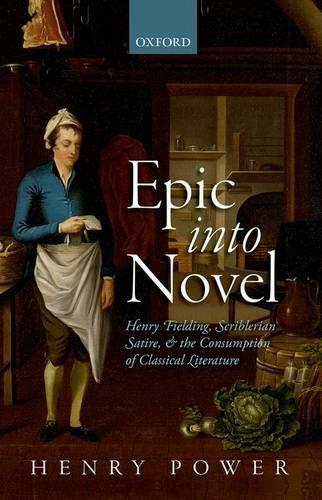Overview
Epic into Novel looks at Henry Fielding's adaptation of classical epic in the context of what he called the 'Trade of . . . authoring'. Fielding was always keen to stress that his novels were modelled on classical literature. Equally, he was fascinated by--and wrote at length about--the fact that they were objects to be consumed. He recognised that he wrote in an age when an author had to consider himself 'as one who keeps a public Ordinary, at which all persons are welcome for their Money.' In describing his work, he alludes both to Homeric epic and to contemporary cookery books. This tension in Fielding's work has gone unexplored, a tension between his commitment to a classical tradition and his immersion in a print culture in which books were consumable commodities. This interest in the place of the ancients in a world of consumerism was inherited from the previous generation of satirists. The 'Scriblerians'--among them Jonathan Swift, John Gay, and Alexander Pope--repeatedly suggest in their work that classical values are at odds with modern tastes and appetites. Fielding, who had idolised these writers as a young man, developed many of their satiric routines in his own writing. But Fielding broke from Swift, Gay, and Pope in creating a version of epic designed to appeal to modern consumers. Henry Power provides new readings of works by Swift, Gay, and Pope, and of Fielding's major novels. He examines Fielding's engagement with various Scriblerian themes--primarily the consumption of literature, but also the professionalisation of scholarship, and the status of the author--and shows ultimately that Fielding broke with the Scriblerians in acknowledging and celebrating the influence of the marketplace on his work.
Full Product Details
Author: Henry Power (Professor of English, Professor in English, University of Exeter)
Publisher: Oxford University Press
Imprint: Oxford University Press
Dimensions:
Width: 14.60cm
, Height: 2.10cm
, Length: 22.30cm
Weight: 0.462kg
ISBN: 9780198723875
ISBN 10: 0198723873
Pages: 248
Publication Date: 19 February 2015
Audience:
College/higher education
,
Undergraduate
,
Postgraduate, Research & Scholarly
Format: Hardback
Publisher's Status: Active
Availability: To order

Stock availability from the supplier is unknown. We will order it for you and ship this item to you once it is received by us.
Reviews
.. .while this fascinating book offers much original material to interest experts, its lucid and elegant style also makes it an excellent introduction to classical reception in this period. -- Bryn Mawr Classical Review
In sum, Power's Epic into Novel offers a scholarly, impressively learned and broadly contextualised re-reading of Fielding's contribution to the bridging of the gap between the classical and the modern. --Jakub Lipski, The Shandean.. .while this fascinating book offers much original material to interest experts, its lucid and elegant style also makes it an excellent introduction to classical reception in this period. -- Bryn Mawr Classical Review
Author Information
Henry Power is Professor of English at the University of Exeter




